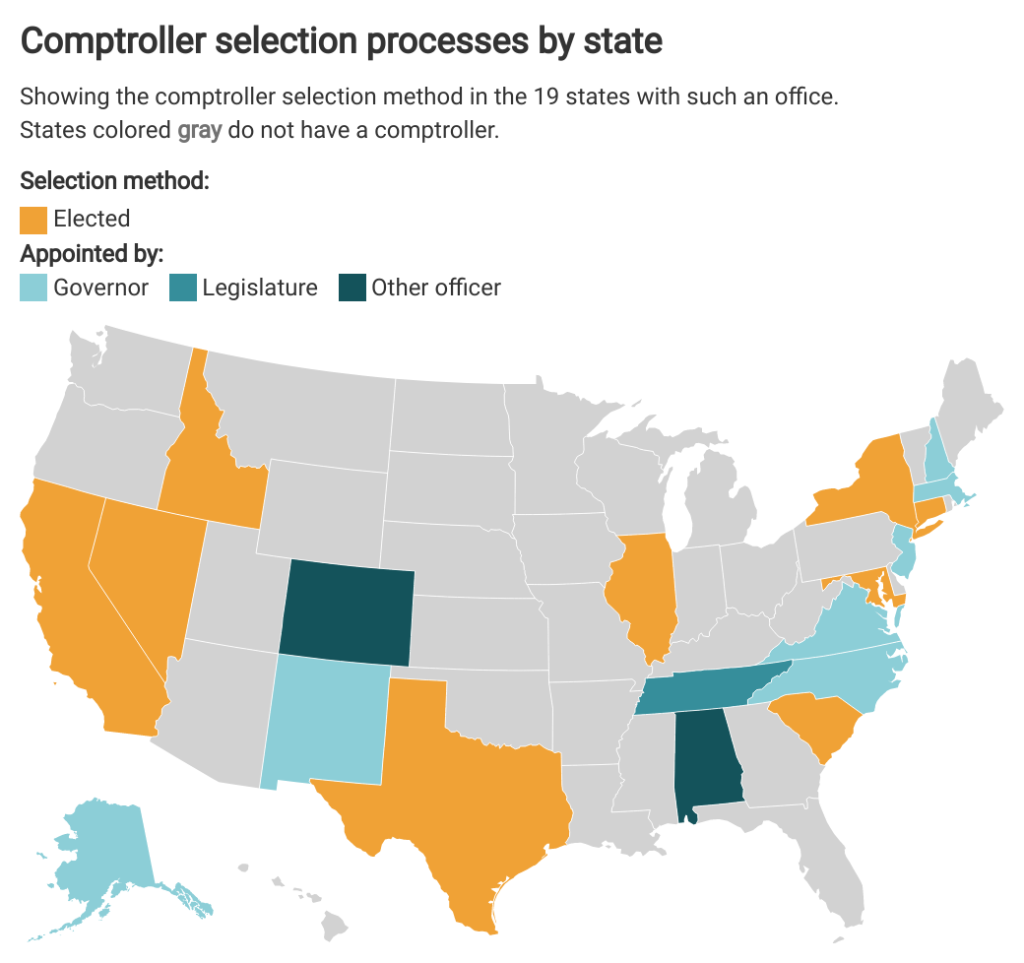Welcome to the Friday, March 24, Brew.
Here’s what’s in store for you as you start your day:
- South Carolina legislature considers amendment to appoint rather than elect state comptroller
- Recall effort against New Orleans mayor fails to qualify for the ballot
- #FridayTrivia: How many vetoes has Congress overridden in U.S. history?
South Carolina legislature considers amendment to appoint rather than elect state comptroller
South Carolina legislators are considering a constitutional amendment to make the state’s comptroller general appointed by the governor rather than elected.
If passed with a two-thirds majority in both chambers, the amendment would appear on the 2024 ballot for voter approval, where it would require a simple majority to become law.
South Carolina is one of 19 states with a comptroller, also known as a controller, a state-level financial officer, and one of nine states that elect its comptroller directly. Most comptrollers share duties similar to state treasurers, exercising powers related to budgetary and management matters.

South Carolina’s current comptroller, Richard Eckstrom (R), was first elected in 2002 and has been re-elected five times. Eckstrom ran unopposed in 2018 and 2022, and last faced a contested Republican primary in 2010.
South Carolina’s government is one of 22 with a Republican trifecta. The party currently controls the governorship and holds a 30-15-1 majority in the Senate and an 88-36 majority in the House.
South Carolina voters rejected an amendment to make the state superintendent an appointed, rather than elected, position in 2018, with 60% opposed.
In 2012, 56% of voters approved an amendment allowing gubernatorial candidates to select their lieutenant gubernatorial running mates. Previously, voters had elected both offices separately.
If the comptroller amendment makes it onto the 2024 ballot and is approved, the position would become appointed after the current comptroller’s term expires. Eckstrom’s term will expire in 2027.
In general, state financial officers—including treasurers, auditors, and comptrollers—are responsible for auditing other government offices, managing payroll, and overseeing pensions. In some states, these officers also invest state retirement and trust funds.
State financial officers are part of the debate over environmental, social, and corporate governance (ESG), an approach to investing and corporate decision-making. If you’d like to learn more about the political and economic debates around ESG, subscribe to Economy and Society, our weekly newsletter that delivers information on the growing intersection of business and politics.
Recall effort against New Orleans mayor fails to qualify for the ballot
Last week, we brought you an update from New Orleans regarding the effort to recall Mayor LaToya Cantrell (D).
On March 21, Gov. John Bel Edwards (D) announced the effort failed, saying recall supporters had submitted 27,219 valid signatures, around 18,000 fewer than the 44,976 needed.
That signature threshold—44,976—was subject to debate throughout the process. Heading into 2023, the signature requirement was 49,975.
But on March 1, Secretary of State Kyle Ardoin (R) and recall supporters announced a consent judgment, revising the number of registered voters in Orleans Parish from 249,876 to 224,876, lowering the signature requirement to its 44,976 level.
Following Bel Edward’s announcement, Cantrell said, “[W]ith the divisiveness of the failed recall campaign officially behind us, we must heal and recommit ourselves to working collaboratively to continue the progress we’ve made.”
Recall supporters said, “The efforts of the recall have only just begun … We are exploring all legal options at this time … We will continue to demand accountability from our elected officials.”
It is uncommon for recall efforts against mayors in the country’s 100 most populous cities to make it onto the ballot.
Since 2010, Ballotpedia has tracked 44 such recall efforts, including Cantrell’s. Forty-two efforts failed to make the ballot.
Of that list, only one, in Omaha, went to a vote in 2011, where Mayor Jim Suttle retained his position with 51% of the vote. The other, in 2013, ended because San Diego Mayor Bob Filner resigned.
#FridayTrivia: How many vetoes has Congress overridden in U.S. history?
In the Wednesday Brew, we told you about President Joe Biden’s (D) veto on March 20, the first veto of his presidency. When the president vetoes a bill, Congress can override it and enact the law with a two-thirds vote in both chambers. While this week’s veto was Biden’s first, presidents have issued 2,585 vetoes in total.
How many vetoes has Congress overridden in U.S. history?

